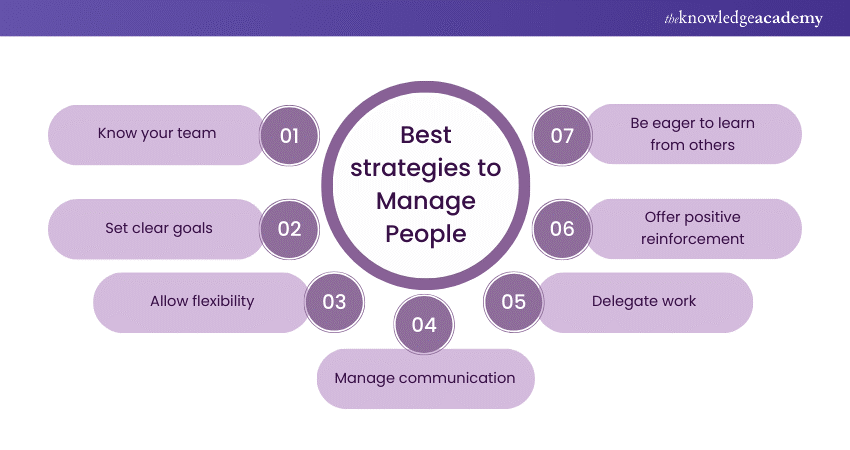We may not have the course you’re looking for. If you enquire or give us a call on +61 1-800-150644 and speak to our training experts, we may still be able to help with your training requirements.
Training Outcomes Within Your Budget!
We ensure quality, budget-alignment, and timely delivery by our expert instructors.

Get perfect at management with Leadership, coaching, and empowerment to steer the organisational dynamics and facilitate a supportive ecology. Let's take it from the beginning to learn How to Manage People with these simple must-have strategies for effective People Management!
In this blog, we will be focusing on How to Manage People and the 15 finest methods of Managing People at work. We will even discuss different Management styles, and you will get the opportunity to determine the style that is suitable for your organisation and your team.
Table of Contents
1) What is People Management?
2) 15 Best Strategies for Managing People at Work
3) People Management styles
a) Coaching People Management
b) Supportive People Management
c) Directive People Management
d) Delegative People Management
4) Conclusion
What is People Management?
People Management includes the range of procedures and the principles by which the leader motivates and develops the employees of an organisation. People Management consists of crucial duties in setting clear goals, providing feedback, resolving conflicts as much as possible, and allowing for open communication.
The major goal of these activities is to make the employees fully equipped and involved in all organisational matters to achieve success. Efficient People Management promotes an environment that provides better conditions for people to flourish and build mutual objectives.
15 Best Strategies for Managing People at Work
Let your team shine with our 15 proven People Management strategies for workplace success.

1) Know your team
Understanding each team member's strengths, weaknesses, and preferences enables personalised management strategies. Leaders may create a work atmosphere where motivated and valued people feel appreciated by attending to their particular requirements. This approach fosters increased productivity and collaboration, ultimately maximising overall team performance.
2) Set clear goals
Establishing objectives helped the team discover the path that they should use to know their roles and duties in the organisation. The knowledge about the goals imposed enables them to concentrate their efforts on other targeted objectives and consequently give them direction and meaning in their work. This alignment ultimately contributes to organisational success.
3) Prioritise your own workload
Effective time management involves allocating time to high-value tasks that contribute significantly to team goals. Prioritisation ensures that essential tasks are addressed promptly, optimising productivity and resource allocation. By managing time efficiently, leaders can maintain the capacity to provide necessary support and guidance to their team, enhancing overall effectiveness.
4) Avoid taking team performance personally
Team performance doesn't define your Leadership value; it's about guiding and supporting the team's growth. Instead of considering setbacks as personal mistakes, it is crucial to look into setbacks as opportunities to improve on self-growth. Accepting these possibilities not only increases effective Leadership but also cultivates a culture of learning and progress
5) Provide consistent Leadership
Consistency in Leadership cultivates trust by demonstrating reliability and predictability in actions and decisions. It provides stability, ensuring clarity and coherence in expectations and direction for the team. Ultimately, this fosters a positive work environment where team members feel secure and empowered to perform at their best.
6) Allow flexibility
Empowering team members to align their work methods with their preferences and circumstances boosts productivity and job satisfaction. By allowing autonomy in approach, individuals can leverage their strengths and optimise performance. This fosters a sense of ownership and fulfilment, driving overall team effectiveness.
7) Be open about goal-setting
The involvement of your team in setting the goals provides a sense of belonging and makes them believe that they are part of the organisation. It guarantees that team members are aware of the objectives, make an effort to reach them and contribute to the achievement of an organisation's general purposes, as it will induce work and passion among them to get results.
Elevate remote team productivity with our Managing Remote Teams Course!
8) Establish clear workflows
Improvement of processes means incorporating and implementing some elementary ideas, removing operations that are not needed and simplifying complex ones. The precise definition of roles ensures that everybody is doing the job they are expected to, thus reducing confusion and overlaps.
This contributes to the effectiveness in that collaborative efforts among team members become more integrated, and the completion of the job is faster, thus leading to the achievement of better results.
9) Manage communication
Collaboration within a team is promoted by open and honest communication, which creates an environment of mutual trust and understanding. It minimises misunderstandings by ensuring that information is clear and accessible to all members. Additionally, it strengthens relationships by encouraging honest dialogue and shared accountability among team members.
10) Delegate work
The practice of delegation leads to team members being responsible for their responsibilities and having a feeling of pride and freedom. It also has a capability to empower individuals as they embrace new experiences and assume new tasks. Moreover, by delegating the activities to the rest of the competent team, managers will have more time to put their efforts on the essential strategic options.
11) Provide constructive criticism with empathy
Continuous evaluation of teammates constitutes friendly and understanding feedback, which allows them to understand their limits and fixed their errors, while assuring their spirits and performance. Through the building of a culture that reinforces the feeling of safety and empowerment of people without the fear of rejection, the method aims at deepening the group cohesion and productivity.
12) Actively address conflicts
Early resolution of conflicts keeps them from becoming more severe, which supports confidence and teamwork. By facilitating constructive resolution, teams can resolve issues efficiently, fostering a positive work environment. This proactive approach shows a dedication to finding solutions to problems and maintaining positive team dynamics.
13) Offer positive reinforcement
The acknowledging and rewarding of individual achievements and team achievements is their contribution and effort appreciated. This serves as a mark that a positive work culture is enforced. An appreciated attitude raises morale by making employees feel that they are important and that their work is recognised. Consequently, such an attitude keeps the group highly motivated and makes them participate in all of the company's achievements even more enthusiastically.
14) Fulfil your own expectations
Setting a consistent example for your team means exhibiting the attitudes, work ethic, and behaviours you expect from them. By demonstrating integrity, dedication, and professionalism in your own actions, you set a standard for others to emulate. This fosters a culture of accountability and inspires team members to align with the organisation's expectations.
15) Be eager to learn from others
Maintaining improvement in People Management Skills requires staying open to feedback and learning. Accepting feedback Sustaining improvement in People Management requires staying open to feedback and learning. Accepting feedback from colleagues promotes teamwork and helps in identifying areas that want improvement. To further improve management skills, consulting mentors and other leaders for advice could offer useful views.
Elevate your management skills with our Senior Management Training now!
People Management styles
Explore various People Management styles to understand how different approaches can impact team dynamics and organisational success.
1) Coaching People Management
In management coaching approach individual growth is supported and it is provided through guidance, backing and empowerment. In addition to offering personalised guidance and mentorship, leaders should focus on helping employees learn how to improve and grow on their own. This is what builds a culture of continuous improvement.
This system works to enhance people's capabilities and inspire them to manage their personal professional development, which in turn produces a workforce able to support with complexity and change in the economy.
2) Supportive People Management
The wellbeing and the professional development of the employees constitute the priorities for the caring supervisor. They play a vital role by actively helping, guiding, and providing the resources which are necessary in the attainment of both individual and socio-cultural goals.
They create a productive culture in which team members are encouraged to rise above the challenges and grow their skills and competencies to become more effective in their jobs. This type of approach not only improves job satisfaction and personal happiness but also generates loyalty and enthusiasm among employees who focus their interest on meeting organisational goals.
Elevate your business with Business Process Improvement Training: join today!
3) Directive People Management
Directive managers take a hands-on approach to Leadership by providing precise instructions and clearly defining expectations for their team members. The objectives to be set in this way not only group workers together, but also provide them with certain desired results, which are in line with the organisation's goals.
Accountability is highlighted in this manner because team members are held responsible for achieving established objectives and are aware of their responsibilities. Through this structured approach, directive managers promote efficiency and clarity, facilitating the achievement of desired results within the team.
4) Delegative People Management
Delegating managers believe in staff empowerment to improve the team members and delegate to them responsibilities and authority to work in their own ways. They delegate tasks to their team members trusting that the team will make the right decision and are aware of the fact that this autonomy can lead to a sense of ownership from each team member.
By relinquishing control and allowing individuals to take the lead in their respective roles, delegative managers promote a culture of self-reliance and initiative. This approach ultimately drives greater motivation and productivity within the team.
Conclusion
Creating a happy and productive work environment requires effective People Management. You can empower your team by learning the fundamentals of People Management and understanding How to Manage People. Implementing best practices and strategies enables them to achieve their full potential and drive organisational success.
Unlock Leadership potential with our Introduction To Managing People Course today!
Frequently Asked Questions

The 5 Cs of People Management are communication, collaboration, conflict resolution, coaching, and creativity.

The key to Managing People lies in understanding their individual needs, motivations, and strengths. By fostering communication, support, clear expectations, and growth opportunities, managers empower team members to make positive contributions to the organisation's success.

The Knowledge Academy takes global learning to new heights, offering over 30,000 online courses across 490+ locations in 220 countries. This expansive reach ensures accessibility and convenience for learners worldwide.
Alongside our diverse Online Course Catalogue, encompassing 17 major categories, we go the extra mile by providing a plethora of free educational Online Resources like News updates, Blogs, videos, webinars, and interview questions. Tailoring learning experiences further, professionals can maximise value with customisable Course Bundles of TKA.

The Knowledge Academy’s Knowledge Pass, a prepaid voucher, adds another layer of flexibility, allowing course bookings over a 12-month period. Join us on a journey where education knows no bounds.

The Knowledge Academy offers various Management Courses, including Introduction to Managing People, Introduction to Supplier management, Managing Remote Teams and Personal & Organisational Development. These courses cater to different skill levels, providing comprehensive insights into Management Skills.
Our Business Skills Blogs cover a range of topics related to Management, offering valuable resources, best practices, and industry insights. Whether you are a beginner or looking to advance your Management Skills, The Knowledge Academy's diverse courses and informative blogs have you covered.
Upcoming Business Skills Resources Batches & Dates
Date
 Introduction to Managing People
Introduction to Managing People
Fri 10th Jan 2025
Fri 28th Feb 2025
Fri 4th Apr 2025
Fri 16th May 2025
Fri 11th Jul 2025
Fri 19th Sep 2025
Fri 21st Nov 2025







 Top Rated Course
Top Rated Course


 If you wish to make any changes to your course, please
If you wish to make any changes to your course, please


